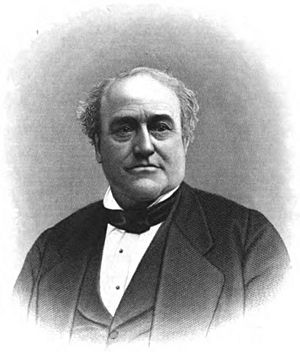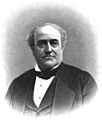Samuel F. Hersey facts for kids
Quick facts for kids
Samuel Freeman Hersey
|
|
|---|---|
 |
|
| Member of the U.S. House of Representatives from Maine's 4th district |
|
| In office March 4, 1873 – February 3, 1875 |
|
| Preceded by | John A. Peters |
| Succeeded by | Harris M. Plaisted |
| Member of the Maine Senate |
|
| In office 1868–1869 |
|
| Personal details | |
| Born | April 12, 1812 Sumner, Massachusetts (now Maine) |
| Died | February 3, 1875 (aged 62) Bangor, Maine |
| Resting place | Mount Hope Cemetery |
| Signature | |
Samuel Freeman Hersey (born April 12, 1812 – died February 3, 1875) was an important politician from the state of Maine. He was also known as a "lumber baron," which means he was very successful in the timber business. Hersey served in the Maine State Senate and later became a United States Congressman. His hometown of Bangor was part of the district he represented.
Contents
Early Life and Education
Samuel Hersey was born in a town called Sumner, which was then in Massachusetts but is now part of Maine. He went to local schools in Sumner and Buckfield. After finishing his own studies, he worked as a school teacher from 1828 to 1831. In 1831, he graduated from Hebron Academy, a well-known school.
Hersey's Business Ventures
Samuel Hersey started his career in the "mercantile business," which means he bought and sold goods. He did this in towns like Lincoln and Milford. Later, he moved into the "lumber business," which involves cutting down trees and selling the wood. He worked in Stillwater, Minnesota and then settled in Bangor.
Becoming a Lumber Baron
In Bangor, Hersey became very successful in the lumber industry. He even partnered with another businessman named Isaac Staples. Together, they worked in the pine forests along the St. Croix River, which is on the border between Minnesota and Wisconsin. Samuel Hersey stayed in Bangor, while his oldest son, Roscoe, managed their business interests out west. The house Roscoe Hersey lived in, built in 1880 in Stillwater, Minnesota, is now a historic landmark.
Besides his timber lands, Hersey was also the president of the Market Bank. This shows he was involved in many different parts of the economy.
Samuel Hersey's Political Career
Samuel Hersey was active in politics for many years. He was elected to the Maine House of Representatives, which is part of Maine's state government. In 1860, he was chosen as a delegate to the 1860 Republican National Convention. At this important meeting, Abraham Lincoln was chosen as the Republican candidate for president.
Working with Lincoln's Vice President
Hersey was a close friend of Hannibal Hamlin, another politician from Bangor. Hamlin later became Abraham Lincoln's Vice President. Because of this friendship, Hersey served on the Republican National Committee from 1864 to 1868. This committee helps guide the Republican Party. From 1868 to 1869, Hersey was elected to the Maine State Senate.
Running for Governor and Congress
In 1870, Samuel Hersey ran for Governor of Maine. He lost the election by a very small number of votes, only 20! However, he was later elected to the Forty-third and Forty-fourth Congresses. He started serving in the U.S. Congress on March 4, 1873. Sadly, he passed away in Bangor on February 3, 1875, before his term in the Forty-third Congress ended. He is buried in Mount Hope Cemetery.
Hersey's Legacy
Samuel Hersey left a lasting gift to the city of Bangor, Maine. He left his large fortune to the city. This money was used to create the Bangor Public Library, which is still an important part of the community today. His money also helped build a new City Hall, though that building was later taken down in the 1960s. A large painting of Samuel Hersey can still be seen in the Bangor Public Library.
Images for kids
 | Calvin Brent |
 | Walter T. Bailey |
 | Martha Cassell Thompson |
 | Alberta Jeannette Cassell |


